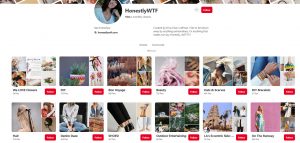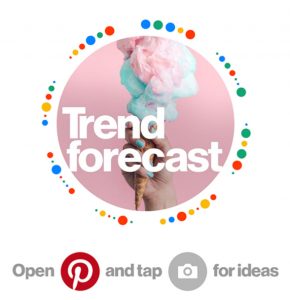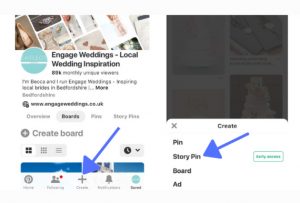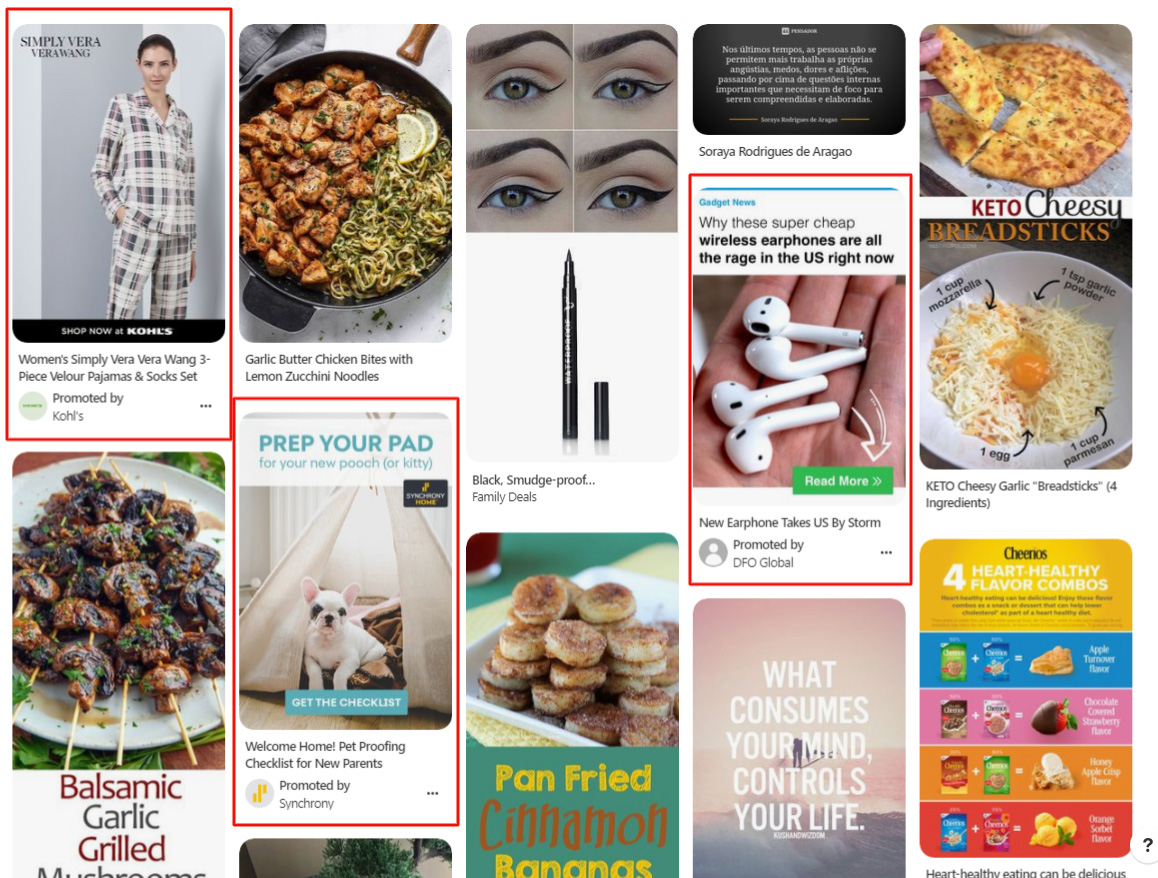Pinterest for
In this guide we’ll cover everything you need to know to become a social media influencer on Pinterest.

Pinterest is a site where 322 billion people a month turn for inspiration and ideas about things they want to make, buy or discover. Although it’s considered a social media site, Pinterest is really more of a powerful search engine. The platform describes itself this way:
“Pinterest is the visual discovery engine. It is where you find and do what you love. With Pinterest, you can discover useful and relevant things that inspire you to do stuff.”
While Pinterest may not yet have similar traffic to social media giants Facebook and Instagram, it’s an excellent platform on which to become an influencer. With this Pinterest influencer manual, we’ll show you how. You’ll learn about the following topics:
- The history of Pinterest
- How Pinterest works
- How to set up Pinterest
- How Pinterest profiles work
- Creating content on Pinterest
- Pinterest influencer best practices
- How to grow followers on Pinterest
- Measuring success on Pinterest
- Popular influencers on Pinterest
- How to make money on Pinterest
Pinterest is a site where 322 billion people a month turn for inspiration and ideas about things they want to make, buy or discover. Although it’s considered a social media site, Pinterest is really more of a powerful search engine. The platform describes itself this way:
“Pinterest is the visual discovery engine. It is where you find and do what you love. With Pinterest, you can discover useful and relevant things that inspire you to do stuff.”
While Pinterest may not yet have similar traffic to social media giants Facebook and Instagram, it’s an excellent platform on which to become an influencer. With this Pinterest influencer manual, we’ll show you how. You’ll learn about the following topics:
- The history of Pinterest
- How Pinterest works
- How to set up Pinterest
- How Pinterest profiles work
- Creating content on Pinterest
- Pinterest influencer best practices
- How to grow followers on Pinterest
- Measuring success on Pinterest
- Popular influencers on Pinterest
- How to make money on Pinterest

A Word About Pinterest Business Accounts
When your goal is to be a Pinterest influencer, we recommend setting up a business account instead of a personal account. You can have both. But a business account is required per Pinterest’s Terms of Service if you use the platform in any way to make money. That can include driving traffic to your monetized blog or finding customers for your products or services.
There’s no cost for setting up either type of account. A Pinterest business account gives you the following advantages that aren’t available in a personal account:
- You have free access to Pinterest Analytics so you can measure your success on Pinterest and know where to make adjustments in your content.
- You can earn money from your Pinterest account by monetizing it with Pinterest ads, Promoted Pins and more.
- Your Pins are optimized for engagement with Rich Pins and Pin Statistics.
- You can create Story Pins only with a business account.
- You’ll create a business profile that’s specific to your branding.
- You have more control over content attribution and branding.
- You can claim your website, other social media accounts and Etsy page and connect them to your Pinterest account. This ensures that your profile picture and name appear on every Pin that has your content on it, even if someone else creates the Pin.
- You have access to Pinterest widgets, which help with content creation.
- You can link your personal account to your business account and switch easily from one to the other.
- Up to four business profiles can be linked to your personal Pinterest account.
Where to Get Pinterest
For the purposes of this Pinterest influencer manual, we’ll focus on the beneficial features of a Pinterest business account. You can set up a business account by attaching it to your personal Pinterest account or by setting up a completely separate business account. Also, you can set up a personal account now and then convert to a business account as your following grows if you like.
Adding a business account to your existing personal account:

If you already have a personal Pinterest account and want to link your business account to it, log in to your personal account. Click the three dots at the top, and choose “Add a free business account.”
Setting up a new business account that's separate from your personal account:

Go to pinterest.com and choose “Create a business account” at the bottom of the signup box.

Enter the email address that you want your Pinterest notifications to come to. Create a password. Click “Create account.”
Setting up your business account details:

Choose your language and the country or region you live in. Click “Next.”

Add the name of your business. This can be your name if you want your name to be your influencer brand. If you already have a business or website set up, choose that name to keep branding consistent.
Next, choose a category that describes what you do. Don’t choose “influencer” if you haven’t achieved that status on another social media platform or website yet. If you don’t see a description that fits you, choose “I’m not sure” or choose “Other” and write in your business or brand type.

Add your website URL if you have one. If you don’t or don’t want to link it, choose “Later.”

Claim your Instagram, Etsy and YouTube accounts if you have them. This is very helpful in increasing your audience and engagement. Any time someone Pins content from one of these sites to Pinterest, the information is added to your stats. Your profile picture and username then also show on the Pins.

Choose whether or not you’re interested in advertising. As an influencer, you’ll likely want to monetize your Pinterest account with ads. If you’re not sure, choose “I’m not sure yet.”

If you’re setting up your business account separately from your personal account, you’ll be asked to identify topics that best describe your business. Choose at least one. If you can find more that are relevant, choose them. Selecting topics that accurately describe your business or brand’s niche keeps the Pins in your home feed relevant.

Adding the Pinterest button to your browser lets you save images and videos that you find on the Web. It’s an essential tool for your Pinterest account for you to curate content from sources beyond your original content. Choose “Get it now.”

Add the Pinterest button to your browser.

Here’s a brief description of how to use the Pinterest browser button. We’ll go into more detail in the Creating Content on Pinterest section of this Pinterest influencer manual.

Finally, you’ll be given the option to create your first Pin. Notice the tips Pinterest gives you for creating Pins that can get more engagement.
You can now create a separate Facebook Page for your brand or business. Since your Page will be linked to your personal profile, you’ll sign into your profile to get to it. You can set up as many Facebook Pages as you like. We recommend setting up just one for your brand so that it’s easier to manage and your audience has one central place to go to find your content. If you’ve diversified and have completely unrelated brands, you can set up separate pages for them.
Setting up your Facebook Page is similar to setting up your profile in that you’ll include photos or a logo or both and identifying information about your brand. Here’s what you’ll do:
How Pinterest Profiles Work
profile is where you can see who’s following you and who you’re following on Pinterest. It’s also where you can find all of the Pins that you save and the boards you create. Pins that you try are grouped here as well.
Your profile also contains your name, your profile photo, your bio and, if you it want to, your location. Anyone can see your profile, but you have the option of creating secret boards that only you can see.
What to Include in Your Pinterest Profile
Creating an accurate and engaging Pinterest profile is important for standing out as an influencer. A well-crafted profile gives people a positive first impression of you and what you’re all about. It also makes your Pinterest account more professional looking and organized. Use the following tips to set up an effective profile.
Photo. Most people like to put a face to a name. Posting a clear, well-cropped photo of yourself helps familiarize people with you and begin to form trust. If your Pinterest account is strictly for business or a brand, put your logo here instead. It’s also effective to use the same photo or logo that you use for your website or other social media accounts for brand consistency.
Name. This can be the business name you chose when setting up your account. If you choose your own name, you need to provide a first name, but your last name isn’t required. You could also have a combination of your name and your business or blog’s name, such as “Amanda Livesay | Fake Ginger.”
Username. Your username is a unique name that you create. If you already have a branded name across other social media accounts, choose the same one for brand consistency. If that name isn’t available on Pinterest, choose a username that’s similar and makes sense for your brand. Pinterest recommends adding numbers if you see the “Oops! Username already taken,” message. Your username can be three to 30 characters long. It cannot contain symbols, spaces or punctuation.
Bio. This is a short description that lets Pinterest users know who you are and what you love, explains Pinterest. Your bio can be up to 160 characters long. Use these tips to craft an effective bio:
- Keep it brief and to the point. Pinterest users are more interested in images than words, so don’t get wordy. A few sentences or phrases that highlight the most important parts of what you do or stand for are sufficient.
- Use keywords that accurately describe you or your business. This helps with search engine optimization (SEO).
- Include your tagline if you have one. This is a phrase that accurately describes you or your business. If you don’t have one, consider creating one. Nike’s “Just Do It” and the U.S. Army’s “Be All You Can Be” are examples of taglines.
- Add a call to action. Asking people to do something is a great way to get more engagement. You can ask them to visit your website, follow your board, sign up for your newsletter or take another action that brings them to your content.
- Link your other social media accounts to your bio. Make sure they’re not your personal accounts unless you want people to see your personal photos and information.
Location. This is optional. It’s more important if you primarily want to appeal to your local community. For instance, if you provide services in person, such as a catering business, sharing your location helps people nearby find you.
Be sure not to share your full address on your Pinterest profile. Your city is sufficient. You could write the state you live in, your country or a combination of these. Or, leave it blank if you prefer.
Creating Pins Using Your Own Content
Facebook is the most widely used social network across the globe, so it makes sense to want to establish your influencer brand on the platform. As of the second quarter of 2019, Facebook had 2.41 billion active users, reports Statistica. That’s a lot of potential people engaging with your brand and your content.
The steps to becoming an Influencer on Facebook share many similarities with becoming an influencer in any industry. An influencer is someone who’s trusted to give an opinion, recommendation or insight that’s reliable because they’ve proven they know what they’re talking about. And that applies to any industry, whether it’s fashion or food, business or backpacking, gaming or gardening, tech or travel. Follow these top tips as you’re establishing your influencer brand on Facebook:
Your own content is a photo or video that you’ve shot yourself or a graphic you’ve created. This media should be saved on your computer if you’re uploading from your desktop or in your device’s library if you’re on mobile. When you make your first Pin, Pinterest gives you step-by-step instructions and tips.

First, add a title and description for your image. These show up on Pinterest users’ home feeds so they can learn more about your Pin before deciding to click on it. Use descriptive words that accurately convey what your Pin is. Include keywords. You can post a Pin without a description, but it’s not recommended. Take advantage of the opportunity to lead more viewers to your Pin with SEO-friendly phrases and words.

Next, add a link to your website, blog, social media channel or other site where you want the viewer to go to see more of your content. This is how Pinterest can drive traffic to your content. That’s especially useful when you have monetized content or a description of your services or products on another site.

Now you can add your image or video by uploading or dragging and dropping. Pinterest has built-in editing tools that allow you to crop your photos, trim your videos and add text descriptions or your logo to the media.

From here, you can also add multiple Pins. This isn’t the same as a Story where all of the Pins are strung in a line cohesively. Batch creation saves you time by letting you create several Pins at one time.

Here’s an example of batch creation of Pins. A benefit to using a batch creator is scheduling your Pins to post at a later date. You can set each one to post on a different day or time of day to space out your Pins. This keeps your content fresh, which helps keep your content at the top of feeds and search results. Hit the dropdown arrow that says “Select” to choose the board your Pin will go into.

Check the Pins you want to upload and press “Publish.”
Pinning Content You've Found on the Internet
When you see images or videos on a website and you want to save them, use the Pinterest browser extension to create your Pin. Here’s how:

Go to a website and hit the red Pinterest button that’s in your browser tab.

Any media that you can Pin will display.

Choose the image or video you want to Pin and add details. Include a description with keywords, the title of the board where it’ll live and hashtags. Choose whether or not you want the board to be secret. Make sure you’re signed into the business or personal account where you want the Pin to go. Press “Create,” and it automatically posts to your profile.
Repinning a Pin on Pinterest
Pinterest itself is a source for adding content to your boards. When you find a Pin on Pinterest that’s relevant to your brand or that you find interesting, Repin it.

When you find a Pin that you like, click on it to open it.

Click on the red Save button.

Choose the board where you want to Pin it, or create a new board. Pinterest suggests using board names based on the content of the Pin.

Click “Create” when you’re done, and the Pin and board then post to your account.
Tips on Selecting the Right Images for Pinterest
Pinterest favors high-quality vertical images that have a 2:3 aspect ratio. Selecting Pins that are attractive and visually pleasing encourages people to engage with them, save them and follow you or your boards. Follow these guidelines from Pinterest to select the right images for your Pins:
- Vertical means the images are taller than they are wide.
- The 2:3 aspect ratio refers to the pixels. Your image’s width should be two-thirds of its height. If your Pin is outside this range, the whole Pin won’t display in a person’s feed. Pinterest provides examples of some image dimensions that have a 2:3 aspect ratio:

- Your Pins are visual cues that lead people to your content. Make sure the Pins are relevant and eye-catching to encourage people to click on them.
Using Video on Pinterest
People love watching video. It’s engaging, instructional and time-saving. Adding video to your content on Pinterest can encourage more engagements and followers. When you have a Pinterest business account, you can upload original video to Pinterest.
Adding subtitles to your videos is wise because many people play video content without the sound. Here’s how to upload video to your Pinterest account:

In your business account, click on the red plus sign. Choose “Create Pin.”

Upload your video or drag and drop it in the Upload box.

Under the video, slide the selector left and right until you find the still shot that you want as your cover image. Add a title, description, link, tags and hashtags as usual. Choose the board your video will be Pinned to and whether to publish it now or later. Click “Publish.”

Use Pinterest’s specs to choose videos that post well on the site.
Tools for Making Great Content on Pinterest
Third-party tools can save you time and effort as you grow your influencer status on Pinterest. Some tools allow you to schedule Pins in advance, while others help you find quality content to Pin or track your analytics. You have a choice of many tools, both free and paid. To get started, here are three of the best free Pinterest tools and one helpful paid tool to help you make great content:
- Canva is a graphic designer that has templates specifically for Pinterest and other social media sites. The tool has over a million images and graphics to choose from, and you can upload your own as well. Adding graphics, text and your logo to your image is easy with the tutorials Canva provides.

Canva has hundreds of Pinterest templates to help you create stunning Pins.
- PinGroupie helps you identify group boards that you may want to join and contribute to. Contributing to group boards gets your content in front of more eyes and can lead to more followers. Choosing boards with more collaborators usually means you’ll be able to Pin more often. Boards with a lot of followers let you tap into more potential followers. Be sure to join group boards that are closely related to your content so you reach the right audience.

When you enter a search term, PinGroupie brings up a list of suggested boards. You’ll see each board’s description, follower count, number of collaborators and more to help decide if you want to join it.
- IFTTT is a social media tool that lets you automatically post content from a Pin on another social media site. IFTTT stands for “if this, then that.” If you want your Pins posted on Instagram, as many influencers do, you can set that up on IFTTT. This not only saves you time but also effortlessly allows you to build content and your influencer status on other social media sites.

IFTTT lets you automatically post content across your social media channels.
- Tailwind is a popular paid tool that can help you with multiple tasks on Pinterest. Its most prominent helper is a scheduler. You can schedule your whole week of Pins in 20 minutes, according to its site. It also gives you additional analytics for each of your Pins and boards and reshares your best content.

Tailwind has multiple features to help you create content on Pinterest.
Popular Influencers on Pinterest
For this influencer manual, we’ve gathered some popular Pinterest influencers who tend to focus on particular niches. Regardless of the categories, you can use these examples for inspiration to make your Pinterest boards unique to you.
Stephanie Brinkerhoff - Beauty Influencer

Stephanie Brinkerhoff of Utah started her career in the beauty industry in 2007 as she was finishing cosmetology school. She found that she loved doing hair and makeup for brides and aspired to make that a full-time living. Stephanie became a social media beauty influencer by posting her stylings on Pinterest and Instagram. Her following on Pinterest has reached 4.8 million.
Stephanie’s Pinterest profile name is Hair and Makeup by Steph, and she has a blog by the same name. On Pinterest, she maintains only six boards to keep her focus refined.
Stephanie’s profile includes a very brief bio that states what she specializes in. She also includes a link to her blog and her email address for a direct way to contact her. She conducts online and in-person workshops, courses and tutorials, and her work is sought after internationally. She uses additional social media platforms to repurpose content, connect with her audience and gain customers. These include Facebook (769K followers), Instagram (564K followers), YouTube (61.5K subscribers) and Twitter (1.3K followers).
Peter Som - Fashion

Peter Som is an acclaimed fashion designer who apprenticed under designers Michael Kors and Calvin Klein. He’s worked with fashion icon Bill Blass and sells his fashion collections at high-end stores such as Saks Fifth Avenue and Neiman Marcus. In 2018, his designs transcended to the home fashion industry as he created a menswear-inspired line of furniture, accessories and wallpaper.
Som uses Pinterest to showcase the ideas and inspirations that influence his fashions. He also Pins his clothing and home decor lines. On Pinterest, he has 2.8 million followers. His bio leads people to his blog, Instagram account and Twitter account. Almost all of his 147 boards have similar numbers of followers: between 71K and 73K. Som also posts his content and connects with his audience on Instagram (38.7K followers), Twitter (30.8K followers) and Facebook (16.8K followers).

Amanda Livesay - Food Influencer

Amanda’s bio is simple: “food blogger.” And the only other information in her profile besides her photo is a link to her blog. But that’s enough for this Pinterest food influencer who has 4.5 million followers. Her 142 boards feature recipe after recipe for sweets, paleo cooking, weeknight meals, holiday fare and a lot more.
Amanda started her blog, Fake Ginger, in 2009 when she was a new mom. She knew nothing about cooking or baking. Her blog was her way of teaching herself how to cook, and along the way she discovered she loved it. Her genuine thrill for her subject matter has advanced her to influencer status. Along with a huge following on Pinterest, she also has 163K followers on Facebook, 31K on Instagram and 4.6K on Twitter.
Ben Uyeda - Home Decor Influencer

Ben Uyeda has 1.3 million monthly Pinterest viewers, 80.2K followers on Pinterest and 1.16 million YouTube subscribers. They appreciate his DIY home decor design ideas that save them money. Uyeda’s focus is to provide people with affordable, durable and elegant furnishing ideas. He uses video tutorials and photos to demonstrate how to build designs from recyclable and repurposed materials, such as a wine bar from copper piping.
His Pinterest profile includes a link to his website and mention of an additional website that he co-founded. On Instagram, Ben has 167K followers, and on Facebook he has 16K followers. He reposts his original content from Pinterest on Instagram.
Mandi Gubler | Vintage Revivals - DIY Influencer
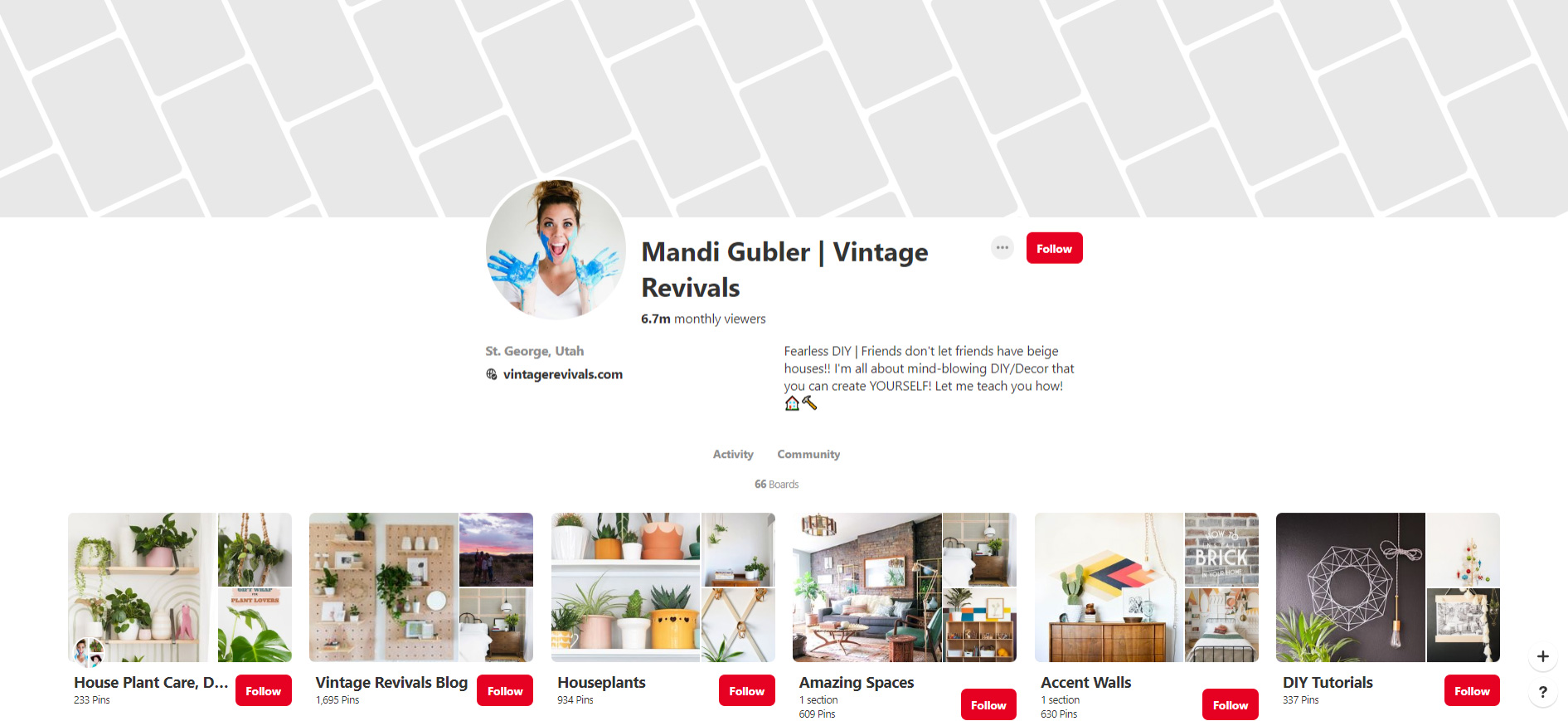
DIY influencer Mandi Gubler shows people how to fearlessly create projects for the home. Her 66 boards range from project ideas for houseplants to furniture and room decor. She also includes DIY boards featuring recipes, crafts, fashion and more. Mandi has 96.8K followers on Pinterest and 6.7 million monthly viewers.
Mandi started her blog about decorating without knowing anything about it, she says. Her humor, engaging style, creativity and helpful tutorials keep viewers coming back for more. On her blog are her tutorials that she posts on Pinterest as well as merchandise for sale.
She reposts her videos on YouTube, where she has 5.57K subscribers. On Instagram, with 139K followers, are her project photos and family pictures. Mandi also keeps in touch on Twitter with 11K followers and on Facebook with 60K followers.
Trey Ratcliff - Travel Influencer

Trey Ratcliff is a computer scientist-turned-photographer in his mid 30s. He started a blog, Stuck in Customs, to post his shots, the stories that went along with them and free tutorials. He writes one post a day and has kept that up for over 10 years. Trey monetizes his blog by selling tutorials, photo presets, e-books, fine art prints, workshops and more.
On Pinterest, Trey has 4.5 million followers. His 38 boards feature travel shots he’s taken around the world and a small amount of curated content. On Instagram, he has 179K followers and includes a link to his SmugMug account, a platform for building original photo galleries. His content is also on Facebook with 331K followers. He keeps in touch with his audience regularly on Twitter as well, with 62.7K followers.
Bonnie Tsang - Art

Bonnie Tsang is a lifestyle photographer with 7 million followers on Pinterest. Her bio describers her as “Artist, Mom, CEO,” which is an effective way to quickly let viewers know what she’s all about. She also lists an award she’s received to garner credibility. And she includes links to her website, Twitter and Instagram.
Bonnie is an internationally acclaimed artist who uses social media as her outlet. Along with Pinterest, she posts on Instagram (76.3K followers) and Twitter (11.3K followers). Although she is a photographer, her Pinterest boards contain mostly curated content, and her account has 511.8K monthly views. Bonnie’s original content lives on Instagram and her website.
January 2010
Silbermann made the very first Pin on the site — a photo of his childhood bug collection — and sent it to all of his friends. According to Silbermann, no one understood the site at first, reports Business Insider. Most of the site’s users were from Silbermann’s hometown of Des Moines, Iowa. He suspects this is because his mother, a doctor, told all of her patients about it.
March 2010
Silbermann, Sciarra and Sharp launched Pinterest as a closed beta website. It didn’t follow the conventional mold of the biggest social media sites at the time: Facebook, Twitter and FriendFeed. Instead of using text-based posts focused on real-time organization, Pinterest’s focus was on creating static image collections. This made it difficult to get investors at first, reports Forbes, as did the fact that two of its founders were non-technical.

Pinterest’s original logo and wordmark.
May 2010
A Pinterest user named Victoria organized “Pin It Forward,” which was like a chain letter. Bloggers exchanged Pinboards about the meaning of home for them. This became a turning point for the site, and people started creating boards on topics that interested them. Victoria later became Pinterest’s community manager.
June 2010
Pinterest had 3,000 registered accounts three months after launching.
August 2010
The site had 5,000 users, according to Business Insider.
March 2011
Pinterest launched its app for the iPhone.
August 2011
Time magazine included Pinterest in its “50 Best Websites of 2011” article.
October 2011
Pinterest secured $27 million in funding.
December 2011
Pinterest reached 11 million total visits per week and ranked within the top 10 social media networks.
January 2012
The site garnered 11.7 million unique users, reports ComScore. It broke the 10-million-unique-visitor mark faster than any site in history to that point. TechCrunch named Pinterest the Best New Startup of 2011 at its Crunchies Awards night.
April 2012
Pinterest reached 17 million users, as reported by Business Insider. The company’s mission was to inspire people, get them offline and do the things they love. It won two Weebly Awards that month: Best Social Media App and People’s Choice Award for Best Functioning Visual Design. Co-founder Paul Sciarra stepped down from his role as president and CEO of Pinterest. He became entrepreneur-in-residence to Andreessen Horowitz, a venture capital firm that invested in Pinterest.
August 2012
Pinterest was no longer an invite-only site. It also launched its Android app and iPad app.

Originally, users had to be invited to join Pinterest, as illustrated above. As of August 2012, the site opened up so that anyone could create an account without an invitation.
October 2012
The social media site became the Internet’s third-largest source of referral traffic, reports Forbes. Pinterest launched a feature allowing users to report and block negative or offensive content in an effort to keep the site “positive and respectful.” The site also added business accounts, allowing companies to convert their existing accounts or start new business accounts.
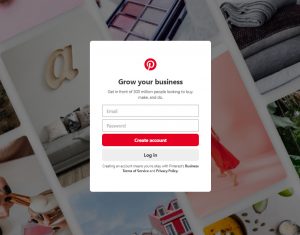
Businesses can create Pinterest accounts to reach potential buyers with content and ads.
February 2013
The site had 49 million users.
July 2013
Pinterest users numbered 70 million.
February 2014
Pinterest had a valuation of $7.7 billion and 140 employees. The site generated over 27% more revenue per click than Facebook and over 400% more than Twitter. A majority of Pinterest users were women (79%), and 25% of Fortune Global 100 companies had Pinterest accounts.
June 2015
The site unveiled Rich Pins, which allowed users to buy products directly from the Pins.

Rich Pins give Pinterest users greater context and more information about a Pin.
2016–2017
Pinterest continued to grow steadily in popularity, adding approximately 10 to 15 million users each quarter. Its active monthly users worldwide were as follows, as reported by Statista:
- March 2016: 128 million
- June 2016: 135 million
- September 2016: 150 million
- December 2016: 160 million
- March 2017: 175 million
- June 2017: 185 million
- September 2017: 204 million
- December 2017: 216 million
January 2018
Brands used Pinterest increasingly for marketing, with 27% of marketers worldwide using the site for promotion. Seventy-eight percent of Pinterest users said they found content from brands to be useful, reports Sprout Social. Twice as many travelers used Pinterest over top online travel agencies for ideas about vacationing.
As of January 2018, twice as many people used Pinterest for travel ideas than top online travel agencies.
March 2018
The site had 239 million active users per month worldwide.
June 2018
Pinterest had a slight drop in usership, but it’s the only drop its seen from this point to November 2019. The site’s 231 million users spent an average of 14.2 minutes per visit on the site. The platform had over 50 billion Pins and over a million boards.
Pinterest boards are groups of Pins organized by topic.
September 2018
Pinterest had 251 million users per month across the globe.
December 2018
The site had 265 million monthly users worldwide.
March 2019
Pinterest reported 291 million users per month worldwide. Of these, 85 million were from the US.
April 2019
Pinterest went public on the New York Stock Exchange (NYSE), trading at $19 per share. The company had a total valuation of $12.7 billion, according to Business of Apps.

A summary of Pinterest’s (PINS) stock prices for its first seven months on the NYSE. Its announcement on October 30, 2019, that its third-quarter revenue was lower than forecasted is blamed for November’s sharp decline in market price, explains CNBC.
June 2019
Pinterest had 300 million active monthly users across the globe, according to Statista.
November 2019
Pinterest employees numbered over 2,000 worldwide, according to its site. The site had over 322 million unique visitors monthly and over 200 billion Pins. Over half of its users lived outside of the United States, and 85% of all users accessed the site via its mobile app.








